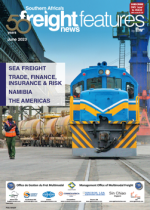A single in-transit container through the Walvis Bay corridor to the Copperbelt can generate over N$190 000 worth of revenue for Namibian clearing agents, transporters, Namport, fuel stations, and permits to the government.“Income tax generated by these Namibian companies is unfortunately now lost to our government,” he said.“Suppose a conservative average of 500 containers of frozen commodities are lost per month to Beira.“In that case, the annual loss of revenue is just under N$1.2 billion, impacting the corridor and its Namibian service providers and adding to the loss of Namibian jobs.”Historically speaking, Namibia has allowed in-transit cargo to landlocked countries for over 25 years.Suddenly changing this overnight, without consultation, had devastating consequences for the sector, the economy, and the port, the executive said.The new regulation is a corridor killer, plain and simple, that will take volume away from Walvis Bay, with billions potentially lost to the fiscus.Furthermore, concerns have been raised by industry associations, such as the Namibian Poultry Association and the Association of Meat Importers and Exporters, regarding a potential increase in the smuggling of non-approved cargo to be sold loc a lly.These concerns have been further exacerbated by the stringent regulations, which appear to have made this practice more lucrative.Industry associations have disclosed information about these illegal products being sold on the Namibian market to the relevant authorities, but no action has been taken.The executive said it posed a significant risk to disease control and resulted in the loss of duties.He added that it was concerning that there might be corruption within the ministries that facilitated these practices in the Port of Walvis Bay and Oshikango.The industry also questions the government’s unwillingness to accept scanned documentation during the permit application process.If such an accommodation was allowed, it could cancel lag and avoidable costs if the courier element required by original documentation was ruled out of the process.However, Namibia’s Ministry of Agriculture, Water and Land Reform, and the relevant minister, Calle Schlettwein, seem unwilling to listen to the industry’s complaints.The new regulation was implemented immediately after a recent European Union audit, which is essential for the prevention of foot-and-mouth disease (FMD) and the export of Namibian beef.“For Namibia to maintain its export status, certain FMD products should not be allowed to move through Namibia without due process,” the executive said.“But this does not clarify the need to clamp down on aquaculture and poultry, which are 90% of the transit perishable volumes meant for landlocked markets.”* Fearing victimisation by the government of President Hage Geingob, this person will remain anonymous.From page 20

